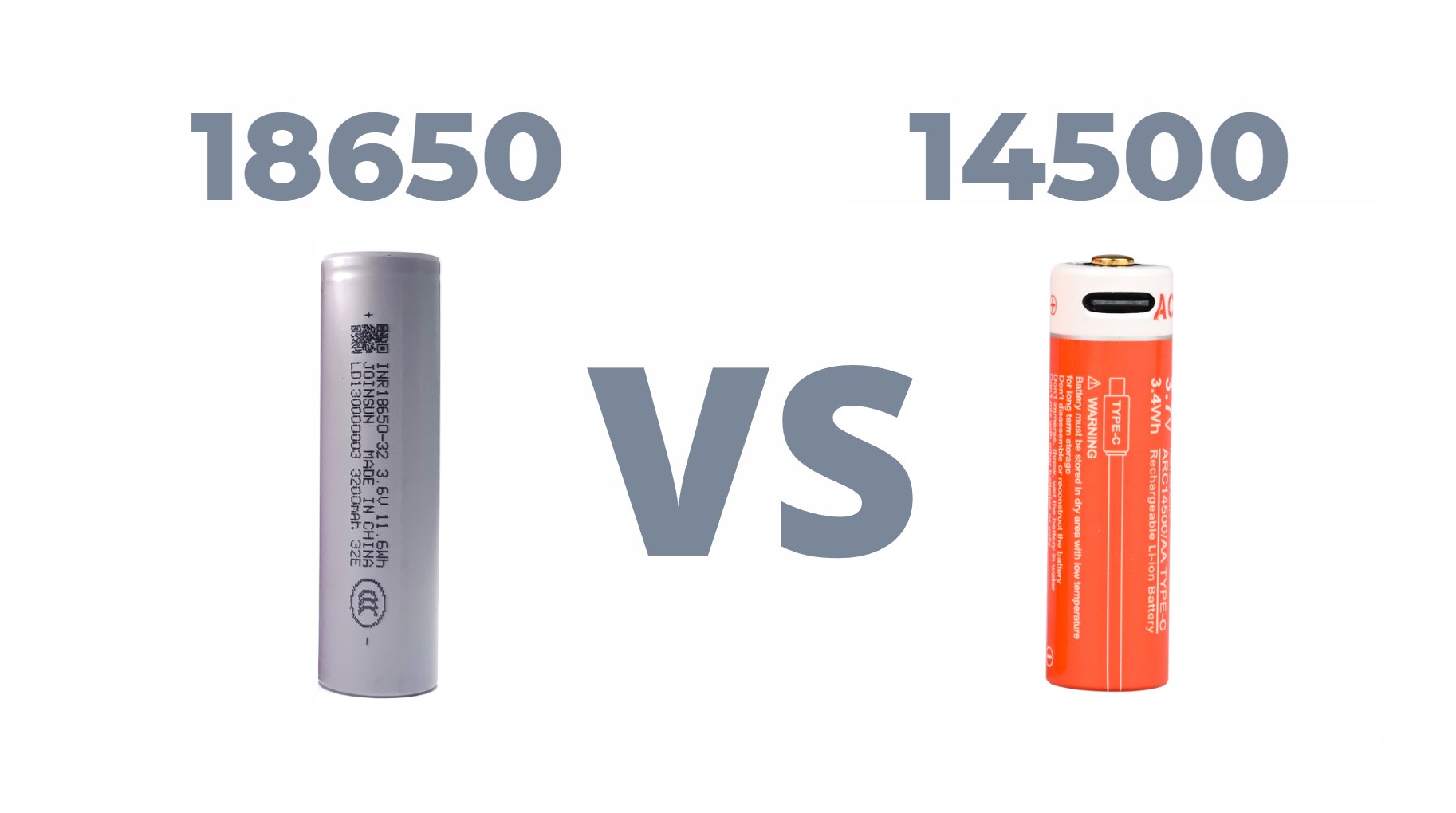When selecting between the 18650 and 14500 batteries, consider their size, capacity, discharge rates, and applications. The 18650 battery offers higher capacity and longer life, making it ideal for high-drain devices, while the 14500 is compact and suited for smaller electronics. Understanding these differences will help you make an informed choice.
How do the sizes of the 18650 and 14500 batteries compare?
The 18650 battery measures 18mm in diameter and 65mm in length, while the 14500 battery is smaller, measuring 14mm in diameter and 50mm in length. This size difference affects compatibility with devices, with the larger 18650 suitable for high-drain applications and the compact 14500 ideal for space-constrained devices.
The 18650 battery measures 18mm in diameter and 65mm in length, while the 14500 battery is smaller at 14mm in diameter and 50mm in length. This size difference significantly influences their compatibility with various devices.
| Feature | 14500 Battery | 18650 Battery |
|---|---|---|
| Diameter | 14 mm | 18 mm |
| Length | 50 mm | 65 mm |
| Weight | ~21 grams | ~48 grams |
The larger size of the 18650 battery allows it to store more energy, making it suitable for power-hungry applications like laptops and electric vehicles. In contrast, the 14500 battery, with its AA-like dimensions, is ideal for compact devices such as flashlights and portable tools.
What are the capacity differences between the two batteries?
Capacity is a crucial factor when choosing between these batteries. The 18650 battery typically has a capacity ranging from 1800mAh to 3500mAh, while the 14500 battery usually offers a capacity of 600mAh to 1200mAh. This difference means that devices powered by an 18650 battery can operate longer between charges, making it more suitable for high-drain applications.
| Battery Type | Capacity Range |
|---|---|
| 14500 Battery | 600mAh – 1200mAh |
| 18650 Battery | 1800mAh – 3500mAh |
The higher capacity of the 18650 battery not only provides longer usage times but also ensures better performance in demanding situations where consistent power output is necessary.
How do the discharge rates of the two batteries differ?
Discharge rates are another critical aspect to consider. The 18650 battery supports higher discharge rates, typically up to 10C, which is essential for applications requiring bursts of power. In contrast, the 14500 battery generally supports discharge rates of around 0.5C to 1C. This makes the 18650 battery preferable for high-performance devices like power tools or electric vehicles that need sudden energy spikes.
Is there a difference in voltage specifications?
Both batteries have similar voltage characteristics, operating at a nominal voltage of approximately 3.7 volts. However, slight variations can occur depending on specific models and manufacturers. It’s essential to check compatibility with your device’s requirements since both batteries can be used interchangeably in many applications.
Which applications are best suited for each type of battery?
The 18650 battery is best suited for high-performance applications such as laptops, electric bicycles, drones, and high-powered flashlights due to its higher capacity and discharge rates. The 14500 battery, resembling an AA battery in size, is ideal for portable electronics like flashlights, remote controls, and small gadgets where space is limited.
The choice between these two batteries largely depends on your specific needs:
- 18650 Battery Applications:
- Laptops
- Electric vehicles
- High-performance flashlights
- 14500 Battery Applications:
- Portable electronic devices
- E-cigarettes
- Smaller consumer electronics
Understanding your device’s requirements will help you select the right battery type for optimal performance.
Expert Opinions
“Choosing between an 18650 and a 14500 battery ultimately depends on your device’s power needs and size constraints,” says Dr. Emily Carter, a battery technology expert. “For high-drain applications where longevity is key, opt for the 18650; however, if compactness is crucial, then the 14500 is your best bet.”
Redway Battery Solutions
For those seeking high-quality lithium-ion batteries, Redway Battery offers a range of options. As a leading manufacturer and wholesaler, Redway Battery specializes in 18650, 21700, and 14500 lithium batteries. With extensive experience and the ability to provide custom battery solutions, Redway Battery is well-positioned to meet the needs of B2B and OEM clients worldwide.
If you need custom golf cart battery solutions or any other specialized battery requirements, contact Redway Battery for a quick quote and discover how their products can enhance your devices’ performance.
In-Depth EBL Batteries Review (AA, 14500, 18650) – Everything You Need to Know in Just 5 Minutes!
Conclusion
In summary, both the 18650 and 14500 batteries have unique advantages that cater to different applications. The larger capacity and higher discharge rates of the 18650 battery make it ideal for demanding devices, while the compact size of the 14500 battery suits portable electronics perfectly. Assessing your specific needs regarding size, capacity, and application will guide you in making an informed decision.
FAQ
- What is the main difference between the 18650 and 14500 batteries?
The primary difference lies in their size and capacity; the 18650 has a larger capacity (up to 3500mAh) compared to the 14500 (up to 1200mAh). - Can I use a 14500 battery instead of an 18650 battery?
It depends on your device’s compatibility; both batteries have similar voltage but differ significantly in size and capacity. - Which battery lasts longer?
Generally, the 18650 battery lasts longer due to its higher capacity, making it suitable for high-drain applications. - Are both batteries rechargeable?
Yes, both types are lithium-ion rechargeable batteries designed for longevity and efficiency. - What should I consider when choosing between these two batteries?
Consider factors such as device compatibility, power requirements, size constraints, and intended use to select the appropriate battery type.



